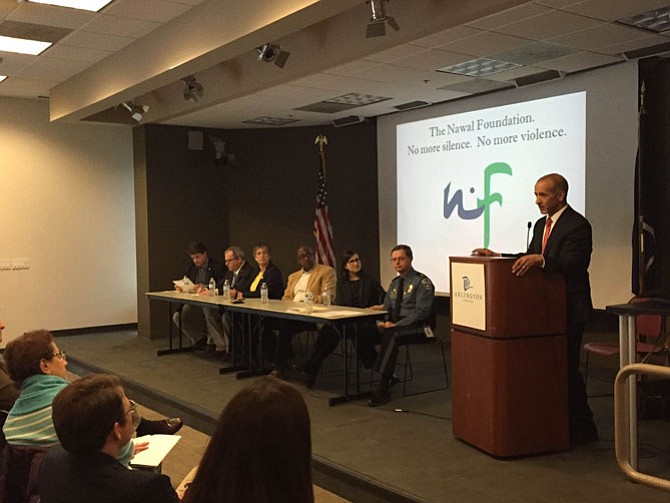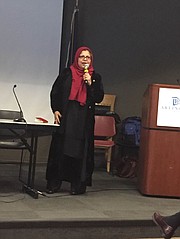Nader Hasan speaks on behalf of his Nawal Foundation at the Muslim Town Hall. Photo by Vernon Miles.
Nader Hasan remembers riding bikes through Shirlington with his cousin. The two of them grew up in the area and watched fireworks together from one of the nearby hills. But the two boys from Arlington grew up into very different men. When Major Nidal Hasan murdered 13 people in Fort Hood in 2009 as part of an attempt to spread fear and hate, it forced his cousin Nader Hasan to confront extremism on both sides of his community and his country.
“We need to make the road [to involvement] less treacherous to traverse.”
— County Board Member Christian Dorsey
Nader Hassan’s story, in some ways, is a reflection of the situation for Muslim Americans throughout the country who struggle to escape the shadow of extremism. At an April 9 event hosted jointly by NOVA Muslim Americans and Veterans for Peace’s “Veterans Challenge Islamophobia” campaign, panelists met at the Arlington Central Library to discuss overcoming intolerance against the local and national Muslim communities. Those speaking on the topic ranged from local students to representatives from the Virginia legislature and a member of the British House of Lords.
Ghizlane Moustaid, chair of the George Mason University Muslim Students Association, said it was challenging to be a student focused on a career while constantly feeling like her identity was being associated with terrorism. Though a generation apart, Sonia Klein from NOVA Muslim Americans said that she recently began seeing a slide back into suspicion and mistrust.
While Klein mostly described Arlington as “Pleasantville,” she said there were some changes in the aftermath of the San Bernardino shooting. After three years of no issues while working at Walter Reed, suddenly guards questioned her and took away her pass, thinking it was fake. Her daughter came home from school one day and said that the other children had been saying that all Muslims are terrorists. A security guard at George Mason called the police on three Muslim students who were on their way to class.
Klein said the original purpose of the meeting was to bring Muslims in the community together, but by far the majority of the attendees were non-Muslim.
That didn’t surprise Nader Hasan, who spoke at the panel on behalf of the Nawal Foundation, a group Hasan founded with Kerry Cahill, daughter of Ft. Hood shooting victim Michael Cahill. He said he had bet Klein that less than 10 percent of those in attendance would be Muslim. According to Hasan, in some ways much of the community is afraid to emerge and speak publicly, especially when cameras and television are brought in.
“Our community is very shy,” said Hasan. We’re still a [relatively] young, still a new community [in this country.]”
A deeper problem, as Hasan noted, was that the extremists on either end of the spectrum weren’t attending the meetings — people like the cousin he says was slowly poisoned by hate.
“We’re not reaching those 25-year-old youth extremists,” said Hasan.
While the majority of the panel focused around combating Islamophobia in mainstream culture, Hasan also noted that there was work that needed to be done within America’s Muslim community.
“Growing up, I never had to question my culture or my religion,” said Hasan. “Post-9/11 kids don’t have that benefit … We’ve failed to engage civically and politically in the time we’ve been here. Our community has a lot to talk about. We don’t tell our kids it’s OK to be an actor or an athlete. We have issues with gender. These are conversations that haven’t happened yet.”
Hasan believes a part of that comes from a perception of the Muslim community that is more monolithic than it really is.
“Who are we?” Asked Hasan. “A lot of Muslims own bars. There are a lot of Muslims that don’t scrape the bacon away,” but then as the audience laughed, Hasan continued, “there are a lot of Muslims that would not find that funny. That’s the difficulty in coming to the table. Who are we? Who do we represent? Right now, extremists and the media are controlling the non-Muslim perception of the community. We need to own our own narrative.”
Hasan introduced an idea that would become central to other discussions in the panel: that the language of a progressive youth was very different from the kinds of conversation Hasan’s generation grew up.
“It’s not about just tolerating,” said Hasan. “It’s not putting up with someone. It’s about mutual respect and understanding. We can’t just coexist, we need to collaborate and support interfaith communities.”
Two freshman members of the County Board, Katie Cristol and Christian Dorsey, spoke at the panel on that topic.
“There is a difference between tolerance and active collaboration,” said Cristol. “The difference is between people being OK with diversity and a community genuinely interested in [diversity].”
Like Hasan, Cristol says she hopes to see more members of the Muslim community involved in local politics and civic groups.
“We need your voices and experience to build the kind of community we want to live in,” said Cristol.
For Dorsey, part of that mission was incumbent on those already inside the government and the civic groups.
“We need to make the road [to involvement] less treacherous to traverse,” said Dorsey. “But civic engagement requires the courageous step of putting yourself out there. That’s easy to say as a non-Muslim, but I know this as an African-American.”
While Arlington struggles to find an ideal route to greater diversity, the representatives from the Virginia legislature painted the state-level politics in a more dire condition.
State Sen. Adam Ebbin recalled that legislators were allowed to bring in religious figures, like priests or rabbis, for invocations. When Ebbin invited Imam Johari Abdul-Malik from Dar Al Hijrah to speak, many people walked out. Some had signs asking why Ebbin supported terrorism.
“Islamophobia is alive and well in Richmond,” said Del. Alfonso Lopez. Lopez remembered the struggle to try and pass a resolution commending Dar Al Hijrah for its community services. Three other bills were put forward by Republican legislators to not spend any money to help Syrian refugees — bills that passed on a party-line vote.
Like Hasan and the County Board members, the legislators said that more involvement from Muslim Americans in state and local politics is the key to combatting those ideas. Ebbin related his own experience as a minority, a gay man, to the Muslim struggle for empowerment. Ebbin said the key is becoming involved in community service, in civic groups, in nonprofits, and to reach into communities outside of their own.

